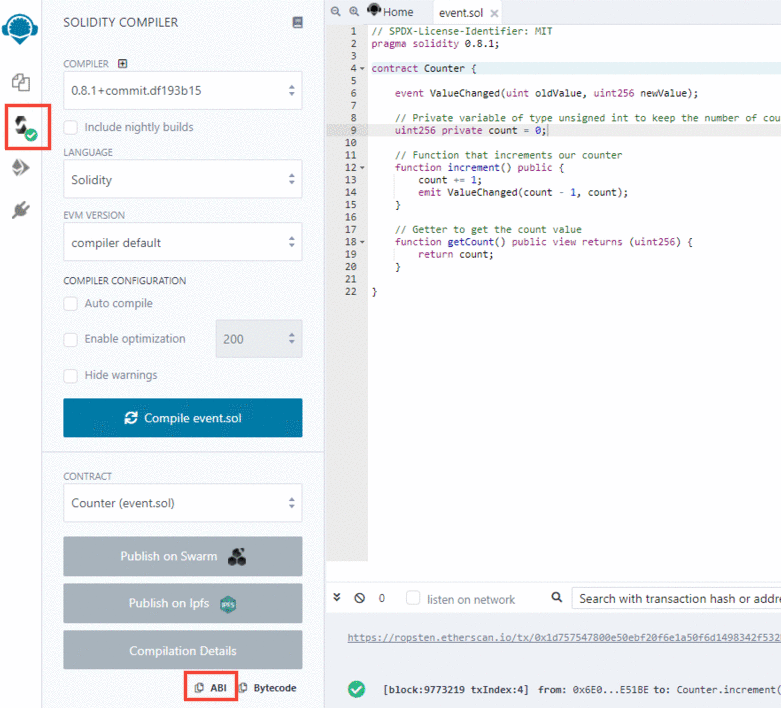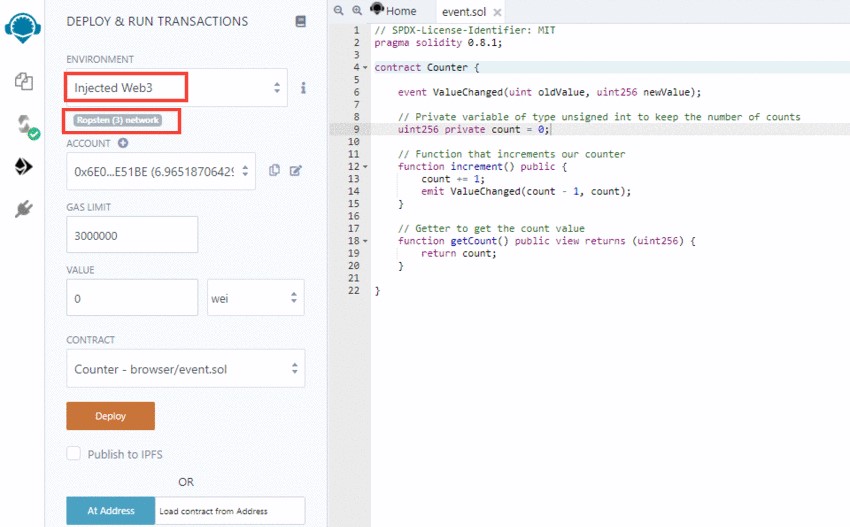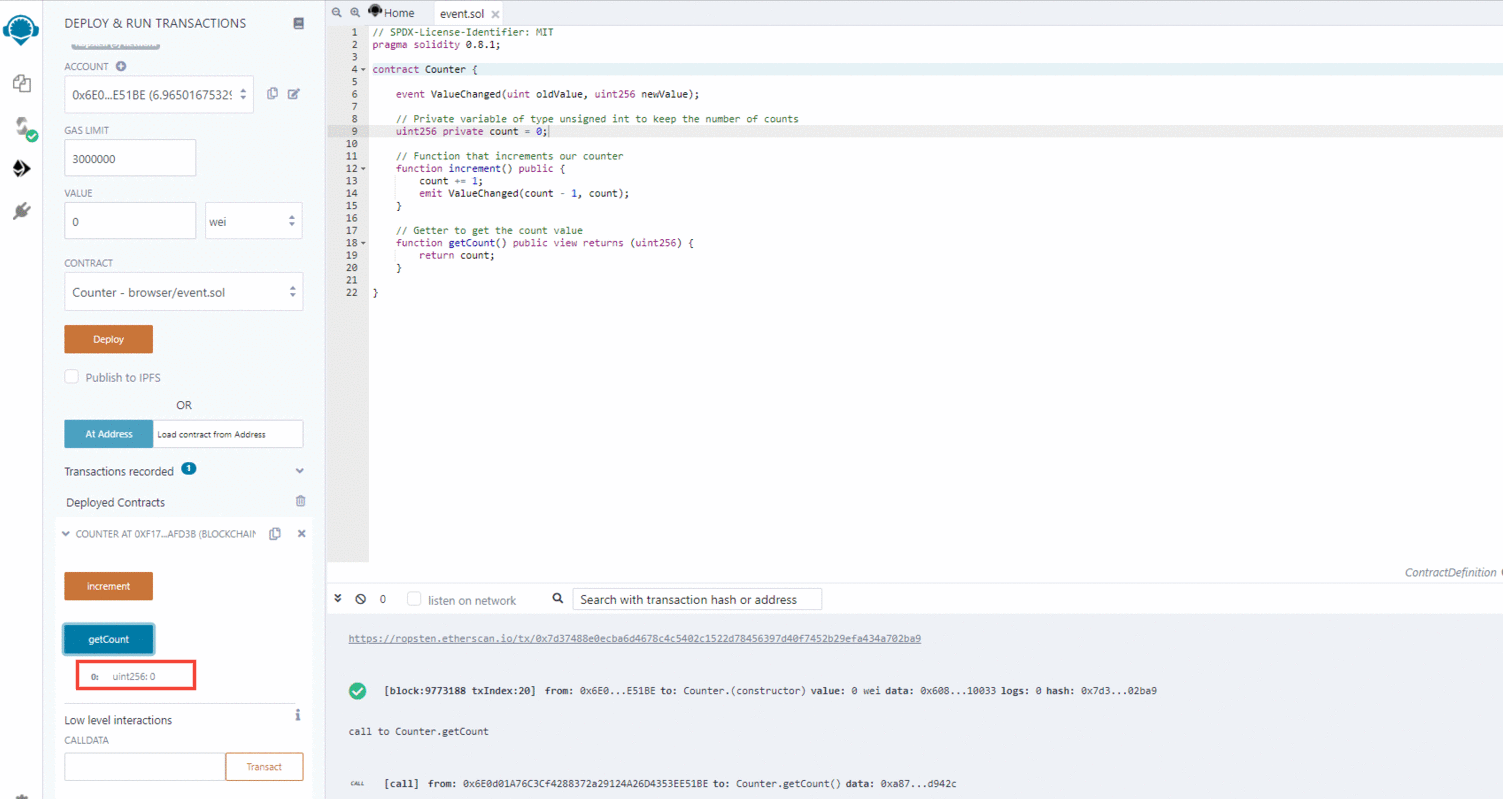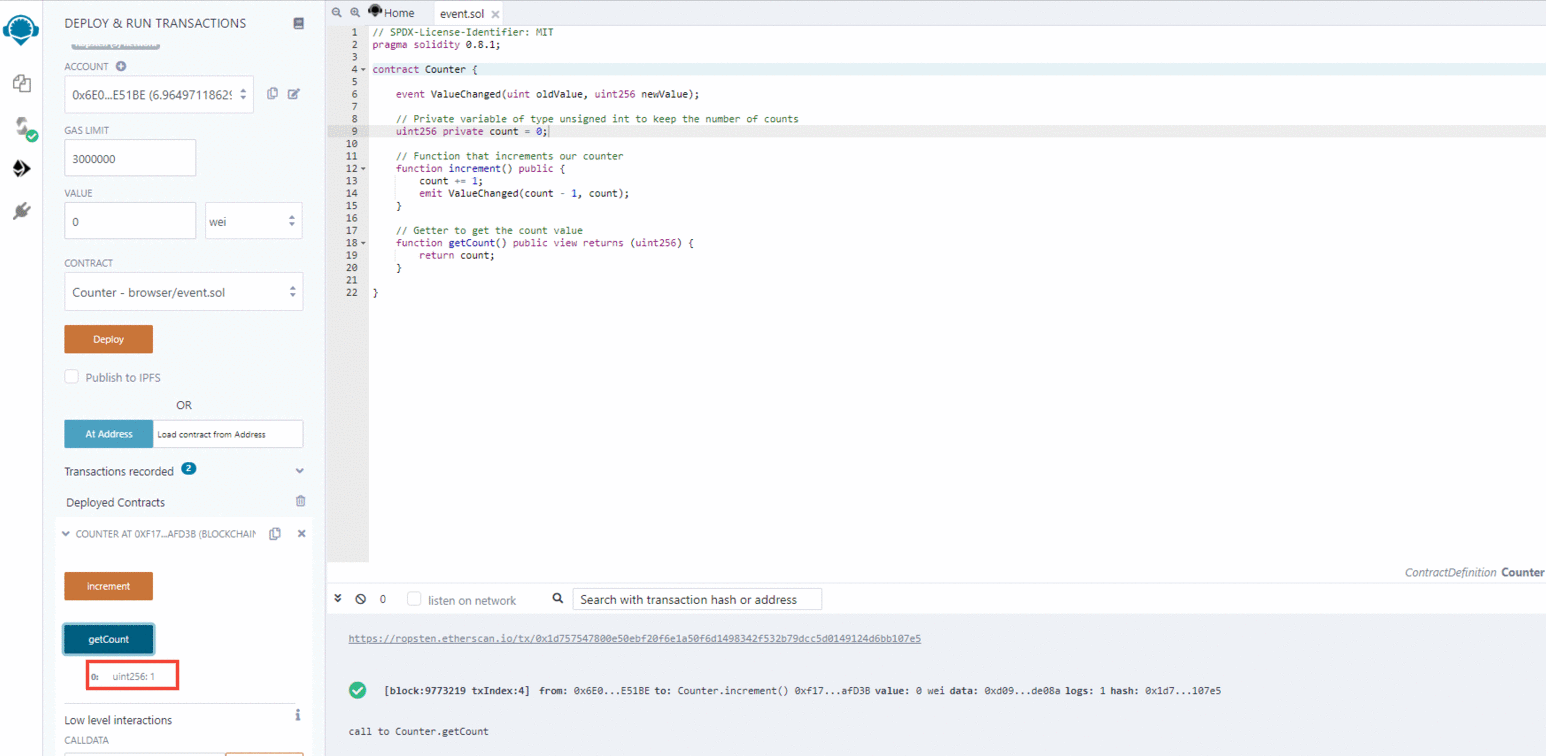10 min read
Overview
Ethereum log records are very useful to understand and keep track of smart contract events. In this guide, we are going to learn how to fetch Ethereum event logs in Ruby using eth.rb Ruby gem.
Prerequisites
- Ruby installed on your system (version >= 2.6, < 4.0)
- Remix IDE
- Metamask wallet
- A text editor (e.g., Sublime Text)
- Ethereum RPC node/endpoint
- Terminal aka Command-Line
What is Ruby?
Ruby is an open-source, interpreted, object-oriented programming language created by Yukihiro Matsumoto (aka Matz), who chose the gemstone's name to imply Ruby is "a jewel of a language." Ruby is designed to be simple, complete, extensible, and portable. Developed mostly on Linux, Ruby works across most platforms, such as most UNIX-based platforms, DOS, Windows, and Mac. According to advocates, Ruby's simple syntax (partially inspired by Ada and Eiffel) makes it readable by anyone familiar with any modern programming language. Ruby is considered similar to Smalltalk and Perl.
What are Ethereum Logs?
In event-driven languages like JavaScript, we often listen to events in order to perform other actions. Solidity (smart contract programming language for Ethereum) provides the same paradigm. In addition to sending real-time events over WebSockets, the EVM (Ethereum Virtual Machine) actually stores a log of the events emitted by a particular smart contract for retrieval over HTTP. These logs are often used for debugging purposes, catching events, or telling the viewer of the records that something has happened.
It is common for log records to be used to describe a smart contract event, like a change of ownership or token transfer. Each log record has topics and data. Topics are 32-byte (256 bit) words that describe what’s going on in an event. Different types of opcodes (LOG0 … LOG1) describe the number of topics that need to be added to the log record. For example, LOG1 can have one topic, while LOG4 can have four topics. Therefore, the maximum number of topics a single log record can have is four. The first part of the log record has an array of topics, and the second part of a log record consists of additional data.
Topics and data work best when used together as there are pros and cons to using each individually. For example, while topics are searchable, data is not. Including data is cheaper than including topics. Topics are limited to 4 * 32 bytes, while event data is not, which means it can consist of large or complicated data like arrays or strings. Events give you a way to add relevant logging data to the logs of a block.
Contracts cannot read events created by smart contracts; however, they can be read outside the blockchain, and as events are immutable, they can be used to keep track of data changes.
Logs need to be decoded to be used outside of the blockchain. Hence, we’ll use eth.rb gem to get and decode the logs of a smart contract event.
What is eth.rb?
eth.rb is a Ruby gem that makes it easy to interact with the Ethereum blockchain using Ruby. With this gem, we can establish a connection to an Ethereum client, make direct JSON RPC calls, and more. If it's your first time using eth.rb, we recommend getting familiar with it in our introductory guide on connecting to the Ethereum network with eth.rb.
Creating and Deploying a Smart Contract
We’ll first deploy a smart contract that will emit an event and then write a small Ruby code to fetch logs of that event.
We’ll deploy our contract on the Ropsten testnet. To start, you will need the Metamask browser extension to create an ETH wallet. You'll also need some test ETH, which you can get by going to the Ropsten faucet. You'll need to select Ropsten Test Network on your Metamask wallet and copy-paste the wallet address into the text field in the faucet, then click "Send me test Ether" (this may slightly depending which faucet you use).
Head over to the Ethereum Remix IDE and make a new Solidity file event.sol.
Paste the following code into your new Solidity script:
Explanation of the code above
- Line 1: Specifying SPDX license type, which is an addition after Solidity ^0.6.8; whenever the source code of a smart contract is made available to the public, these licenses can help resolve/avoid copyright issues. If you do not wish to specify any license type, you can use a special value UNLICENSED or simply skip the whole comment (it won’t result in an error, just a warning).
- Line 2: Declaring the solidity version.
- Line 4: Starting our Contract named Counter.
- Line 6: Creating an event ValueChanged with two arguments, oldValue will be the input value of count and newValue which will be the output value of count.
- Line 9: Declaring a private variable count with initial value zero.
- Line 12-15: Creating a public function increment, increasing the value of count by 1, and emitting the event ValueChanged with oldValue = count’s current value minus 1 and newValue = count’s current value.
- Line 18-19: Creating a public function getCount to return the value of count.
Compile the smart contract and deploy it using Injected Web3; make sure to select the Ropsten network on your Metamask plugin before deploying the contract.
Also, copy the ABI of the contract from the compile tab. We’ll need it later.


You will see your contract under the "Deployed Contracts" section in Remix. Open the deployed contract and click on getCount; you’ll see that the value returned is zero, which is expected.

Now click on increment to increase the value of count by one, confirm the transaction, and after receiving the transaction confirmation notification, click again on getCount. This time you’ll see that the value of the count has been changed.

We’ll fetch logs for this transaction. Copy the contract address from the copy button near the contract’s name under the “Deployed contracts" section. Learn more about smart contracts and Solidity by going through the Solidity section of QuickNode guides.
Establish a Connection to Your RPC
We could use pretty much any Ethereum client for our purposes today. Since that is a bit too involved for fetching logs, we'll just grab an endpoint from QuickNode. to make this easy. If you don't yet have a QuickNode endpoint, you can create a free account here. We’ll need a Ropsten endpoint to get data from the chain as we’ve deployed our contract on the Ropsten testnet. After you've created your Ethereum endpoint, copy your HTTP Provider endpoint:

You'll need this later, so copy it and save it.
Getting Logs in Ruby
Installing the eth.rb gem
Let’s first make sure we have Ruby installed on the system. To check just copy-paste and run the following in your terminal/cmd:
ruby -v
If this returns a version later than 2.6, you're all set! If the command is not recognized, then you will need to install Ruby. If it is and the version is older than 2.6, you will need to upgrade to a newer version.
Note: the version of Ruby that ships with macOS is usually for Apple's own use and it is best not to change it. You can make changes to this version, however, instead, we suggest using rbenv or RVM (Ruby Version Manager) to manage a separate Ruby version, which will be installed into a sandbox in your home directory. You can make changes to this version without worrying about changing the system's Ruby version. For more information, read this external guide from mac.install.
Once you're ready to move on, we can install the eth.rb gem. This gem will allow us to connect to the Ethereum blockchain network using the Ruby language. We can install it from the command line using the RubyGems package manager:
Let's move forward and install the eth.rb gem, You can install it from the command line using RubyGems, the package manager for Ruby.
gem install eth
You'll also need to install a gem called forwardable:
gem install forwardable
Creating and Running a Ruby Script to Fetch Logs
Open your text editor and create a Ruby file log.rb, copy-paste the following in it.
require 'eth'
require 'forwardable'
client = Eth::Client.create 'QUICKNODE_HTTP_PROVIDER_LINK'
contract_address = "CONTRACT_ADDRESS_FROM_REMIX"
contract_name = "Increment"
contract_abi = '[
{
"inputs": [],
"name": "increment",
"outputs": [],
"stateMutability": "nonpayable",
"type": "function"
},
{
"anonymous": false,
"inputs": [
{
"indexed": false,
"internalType": "uint256",
"name": "oldValue",
"type": "uint256"
},
{
"indexed": false,
"internalType": "uint256",
"name": "newValue",
"type": "uint256"
}
],
"name": "ValueChanged",
"type": "event"
},
{
"inputs": [],
"name": "getCount",
"outputs": [
{
"internalType": "uint256",
"name": "",
"type": "uint256"
}
],
"stateMutability": "view",
"type": "function"
}
]'
contract = Eth::Contract.from_abi(name: contract_name, address: contract_address, abi: contract_abi)
params =
{
address: contract.address,
fromBlock: "earliest",
toBlock: "latest",
topics: []
}
events = client.eth_get_logs(params)["result"]
event_abi = contract.abi.find {|a| a['name'] == 'ValueChanged'}
event_inputs = event_abi['inputs'].map {|i| i["type"]}
events.each_with_index do |event, index|
transaction_id = event["transactionHash"]
transaction = client.eth_get_transaction_receipt(transaction_id)
logs = transaction.dig('result', 'logs').find { |d| d['data'] != "0x" }
data = logs.fetch('data')
eventlogs = transaction.inspect
block = logs.fetch('blockNumber')
contract_values = Eth::Abi.decode(event_inputs, data )
puts "Transaction: #{index+1}"
puts "Transaction ID: #{transaction_id}"
puts "The Transaction was added to block: #{block.to_i(16)}"
puts "Contract Logs:"
event_abi['inputs'].each_with_index do |value,index|
puts "#{" "* 3} #{value["name"]}: #{contract_values[index]}"
end
puts "Event Logs:"
puts eventlogs
puts "-" * 20
end
Make sure to replace QUICKNODE_HTTP_PROVIDER_LINK with the Ropsten HTTP Provider, CONTRACT_ADDRESS_FROM_REMIX with the address of the deployed contract from the previous sections, and contract_abi with the abi value you copied from the Remix.
Explanation of the code above
- Line 1-2: Importing required gems.
- Line 4: Define the client using Ropsten endpoint from QuickNode.
- Line 5-6: Define your contract address (copy from Remix) and your contract name, 'Increment'.
- Line 7-48: Replace contract_abi with your ABI, which you copied in the previous section (if you used the same smart contract, you use the same ABI).
- Line 49: Instantiating our contract object and getting the contract.
- Line 51-57: Defining our search parameters using the contract address and earliest and latest blocks.
- Line 58: Getting logs based on our search parameters and storing them in the events variable.
- Line 60: Finding the event ValueChanged from the ABI and storing it in the event_abi variable.
- Line 61: Mapping our event_abi to find the input types and storing the array in our event_inputs variable (we'll use this to decode our smart contract).
For each Transaction in our Logs:
- Line 64: Getting the transaction hash and storing it in the transaction_id variable.
- Line 65: Getting transaction details using the eth_get_transaction_receipt method for transaction hash via our node.
- Line 66: Searching the event logs for results and logs and storing it in a logs variable.
- Line 67: Fetching data from logs and storing it in a data variable.
- Line 68: Getting the transaction details using inspect method and storing it in eventlogs variable.
- Line 69: Fetching blockNumber from logs and storing it in block variable.
- Line 70: Decoding the event_inputs and data and storing it in contract_values variable.
- Line 71-80: Printing results from our search.
- Line 75-77: For each transaction, we print decoded values returned by our smart contract (in this case, the oldValue and newValue that we defined when creating our smart contract).
Now, save log.rb and run it as follows:
$ ruby log.rb
If everything goes right, your output must look like this:

The output has the transaction, block number, contract logs, and the event details.
Conclusion
Congrats! You've learned about Ethereum event logs and how to filter and extract information from them using Ruby.
Subscribe to our newsletter for more articles and guides on Ethereum. If you have any feedback, feel free to reach out to us via Twitter. You can always chat with us on our Discord community server, featuring some of the coolest developers you’ll ever meet :)